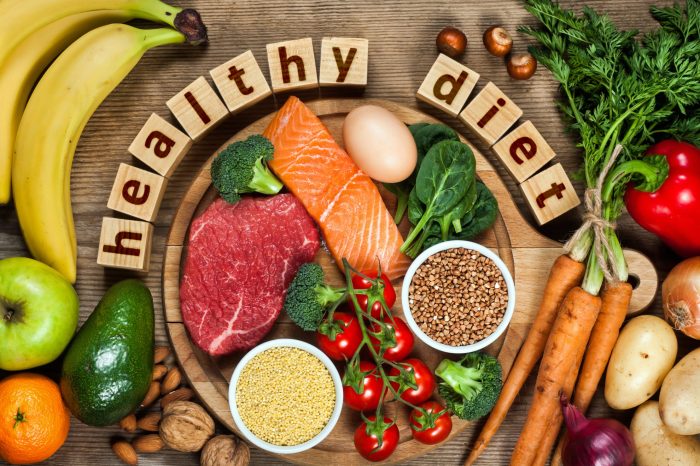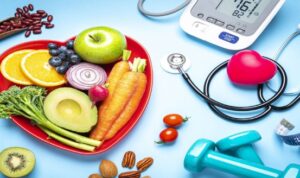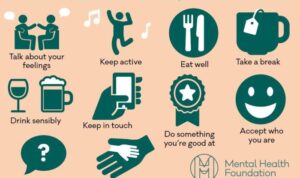Balanced diet reigns supreme in the realm of health and wellness, offering a vital foundation for a thriving lifestyle. Dive into the essentials of maintaining a well-rounded diet that fuels your body and mind.
As you journey through the details below, you’ll uncover the secrets to a balanced diet and how it impacts your overall well-being. Get ready to revolutionize your approach to eating!
Importance of a Balanced Diet

Maintaining a balanced diet is crucial for overall health and well-being. It provides the necessary nutrients to support bodily functions, promote growth, and prevent diseases. Without a balanced diet, individuals may experience deficiencies or excesses that can lead to various health issues.
Key Components of a Balanced Diet
- Proteins: Essential for cell repair, growth, and maintenance. Found in meat, poultry, fish, dairy, and plant-based sources like beans and nuts.
- Carbohydrates: Main source of energy for the body. Found in grains, fruits, vegetables, and legumes.
- Fats: Important for energy storage, hormone production, and insulation. Found in oils, nuts, seeds, and avocados.
- Vitamins and Minerals: Regulate various bodily functions and support immune health. Found in fruits, vegetables, dairy, and whole grains.
- Water: Essential for hydration, digestion, and temperature regulation. Found in beverages and water-rich foods.
Benefits of a Balanced Diet vs. Unbalanced Diet
- Improved Overall Health: A balanced diet provides the necessary nutrients for optimal health, while an unbalanced diet lacking in essential nutrients can lead to deficiencies and health issues.
- Weight Management: Consuming a balanced diet helps maintain a healthy weight, while an unbalanced diet high in processed foods and sugars can contribute to weight gain and obesity.
- Energy Levels: The right balance of nutrients in a diet can help sustain energy levels throughout the day, while an unbalanced diet lacking in key nutrients may result in fatigue and weakness.
- Disease Prevention: A balanced diet rich in vitamins, minerals, and antioxidants can help prevent chronic diseases such as heart disease, diabetes, and certain cancers, whereas an unbalanced diet may increase the risk of developing these conditions.
Components of a Balanced Diet

Eating a variety of foods from different food groups is essential for a balanced diet to ensure you get all the necessary nutrients your body needs to function properly.
Fruits and Vegetables
Fruits and vegetables are rich in vitamins, minerals, and fiber that are essential for overall health and well-being. They help boost the immune system, aid digestion, and reduce the risk of chronic diseases like heart disease and cancer.
- Recommended Daily Intake: 5 servings of fruits and vegetables per day
Proteins
Proteins are the building blocks of our body, necessary for growth, repair, and maintenance of tissues. They also help in the production of enzymes and hormones.
- Recommended Daily Intake: 0.8 grams of protein per kilogram of body weight
Carbohydrates
Carbohydrates are the primary source of energy for our body. They are essential for brain function and provide fuel for physical activity.
- Recommended Daily Intake: 45-65% of total daily calories from carbohydrates
Fats
Fats are important for energy storage, insulation, and the absorption of fat-soluble vitamins. Healthy fats like omega-3 fatty acids are essential for heart health.
- Recommended Daily Intake: 20-35% of total daily calories from fats
Effects of a Balanced Diet on Health
Eating a balanced diet not only affects your physical health but also plays a crucial role in preventing chronic diseases, improving mental health, and maintaining a healthy weight.
Prevention of Chronic Diseases
A balanced diet rich in fruits, vegetables, whole grains, lean proteins, and healthy fats can significantly lower the risk of developing chronic diseases such as heart disease, diabetes, and obesity. By reducing intake of processed foods, saturated fats, and added sugars, you can protect your body from these serious health conditions.
Improvement in Mental Health and Cognitive Function
Consuming nutrient-dense foods like leafy greens, nuts, seeds, and fatty fish can enhance brain function, mood, and overall mental well-being. These foods provide essential vitamins and minerals that support cognitive function, reduce inflammation, and promote a healthy nervous system. A balanced diet is key to maintaining optimal mental health and cognitive performance.
Contribution to Maintaining a Healthy Weight
A balanced diet that includes appropriate portions of different food groups helps regulate metabolism, control appetite, and manage weight effectively. By focusing on nutrient-rich foods and avoiding empty calories, you can achieve and sustain a healthy weight. Additionally, maintaining a healthy weight through a balanced diet reduces the risk of obesity-related health issues, such as heart disease and diabetes.
Tips for Achieving a Balanced Diet
To maintain a balanced diet, it is essential to follow some tips and strategies that can help you stay on track with your nutrition goals.
Sample Meal Plan for a Balanced Diet
Here is a sample meal plan for a day that represents a balanced diet:
| Meal | Food | Portion Size |
|---|---|---|
| Breakfast | Whole grain toast with avocado and poached eggs | 1 slice of toast, 1/2 avocado, 2 eggs |
| Lunch | Grilled chicken salad with quinoa | 4 oz chicken, 1 cup mixed greens, 1/2 cup quinoa |
| Snack | Greek yogurt with berries | 1/2 cup yogurt, 1/4 cup berries |
| Dinner | Baked salmon with sweet potato and steamed broccoli | 4 oz salmon, 1 medium sweet potato, 1 cup broccoli |
Strategies for Meal Prep and Portion Control, Balanced diet
- Plan your meals in advance and batch cook to save time during the week.
- Use smaller plates to control portion sizes and avoid overeating.
- Measure your food portions using measuring cups or a food scale to ensure accuracy.
- Divide your plate into sections for proteins, carbohydrates, and vegetables to maintain a balanced meal.
Healthy Snack Options
Here are some healthy snack options to incorporate into a balanced diet:
- Carrot sticks with hummus
- Apple slices with almond butter
- Greek yogurt with granola
- Raw nuts and seeds
- Rice cakes with avocado



